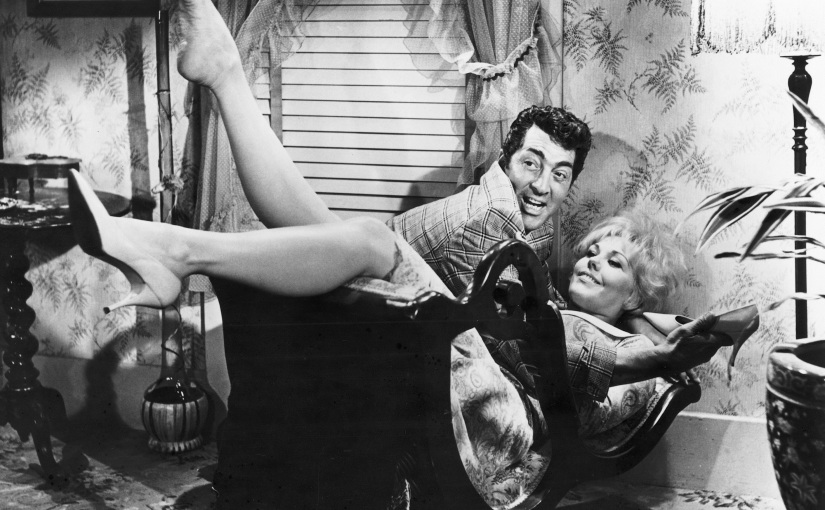Thank you to everyone who came to our screening of Kiss Me, Stupid last month at the Art House Crouch End. Here is a summary of notes from Iris Veysey’s introduction to the film.
Kiss Me, Stupid (1964) was nothing but trouble for director Billy Wilder. Dogged by difficulties in production (Peter Sellers was originally cast in a lead role but had to quit for health reasons), it was slammed on its release.
Kiss Me, Stupid follows ‘Dino’ (Dean Martin, playing a thinly disguised version of himself), a famous singer who finds himself stranded in the small town of Climax, Nevada. Here he is taken in by Orville Spooner (Ray Walston), a struggling songwriter who lives with his young wife Zelda (Felicia Farr). Orville hopes to sell Dino one of his songs, but he becomes convinced that Dino will seduce Zelda. He decides to solve the problem by recruiting local waitress and prostitute ‘Polly the Pistol’ (Kim Novak) to pose as Zelda and sleep with Dino.
Prostitution, pimping, the transactional nature of sexual relationships – these are running themes in Wilder’s work (a fact which some scholars attribute to Wilder’s own experience as a gigolo in his youth). Overt examples include Irma La Douce (1963) in which Shirley Maclaine plays a prostitute and Jack Lemmon her would-be pimp, and Sunset Boulevard (1950) in which Joe (William Holden) essentially becomes a gigolo for Norma Desmond (Gloria Swanson). In 1944’s Double Indemnity Phyllis (Barbara Stanwyck) uses her sex appeal to persuade Walter (Fred MacMurray) to murder her husband. And in The Apartment (1960), Jack Lemmon’s CC Baxter actively facilitates his managers’ extramarital affairs in the hopes of progressing at work. Sex and intimacy are exploited for professional or commercial gain time and again in Wilder’s films. In that sense, Kiss Me, Stupid fits in very neatly with his other work.
None of the male characters in Kiss Me, Stupid treat women well, but Dino is particularly abhorrent. He’s sleazy, misogynistic, and he sees sex as a daily necessity which he not only desires but deserves. Yet his behaviour is not only tolerated, but enabled and encouraged by those around him, who are dazzled by his fame and, more importantly, want a slice of the success for themselves. So this is a film not only about sex, but about the power of celebrity, and I think that makes it a particularly interesting film to watch right now.
When Kiss Me, Stupid was released in December 1964, Wilder was on a roll. He’d had a run of critical and commercial hits, including Some Like It Hot (1959), The Apartment and Irma La Douce, and the Museum of Modern Art in New York had just begun a retrospective of his work. But then Kiss Me, Stupid came out. With its sexually frank content and its flippant attitude to marital infidelity, the film proved too much for the press at the time. Critics accused Wilder of cruelty and cynicism in his treatment of small-town America, and one reviewer even called for him to be deported.
The New Yorker called it ‘repellant and squalid’. Life described it as ‘a titanic dirty joke’. Films in Review mused, ‘one wonders about Billy Wilder – is senility setting in or has he always been, not quite bright?’ It was officially condemned by the Catholic League of Decency and some cinemas refused to show it. One of the few positive notices came from Joan Didion, who was the film critic at Vogue at the time. Titling her review ‘A minority report’ Didion defended the film, writing,
the ugliness of a town on that desert …where time is told by television schedules, where no one is beautiful or gifted…a place where the flesh is urgent because nothing else is. In its feeling for such a world, such a condition of the heart, Kiss Me, Stupid is quite a compelling and moving picture.
Wilder was so touched by Didion’s review that he actually replied to her review, writing, ‘I read your piece in the beauty parlor while sitting under the hair drier, and it sure did the old pornographer’s heart good. Cheers. Billy Wilder.’
Iris Veysey, 2018
